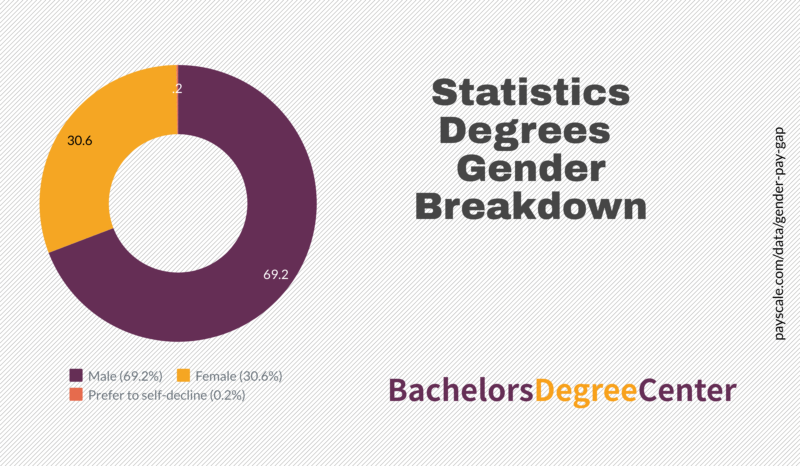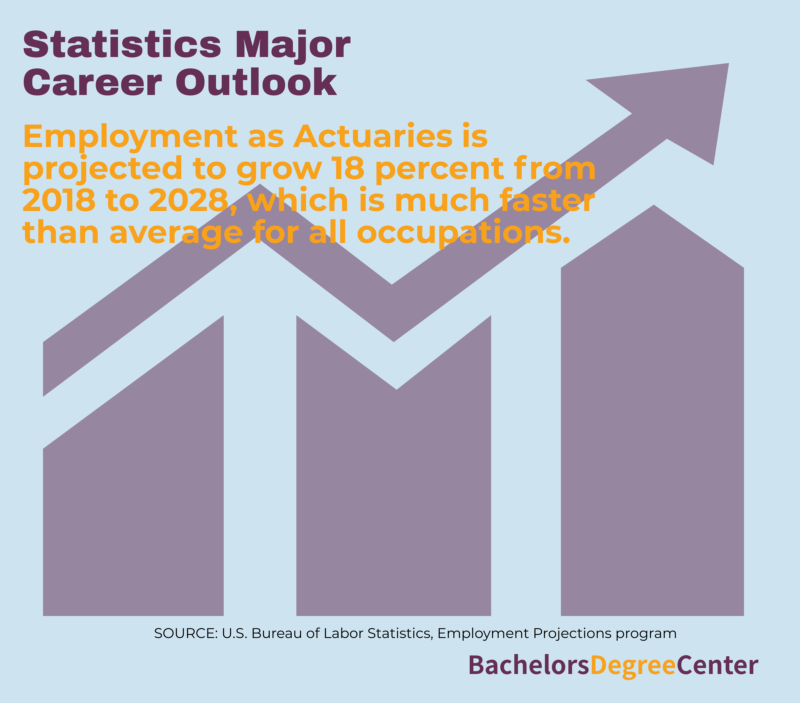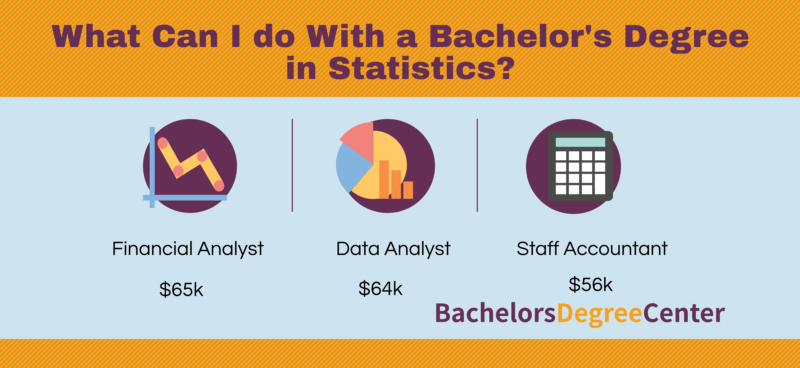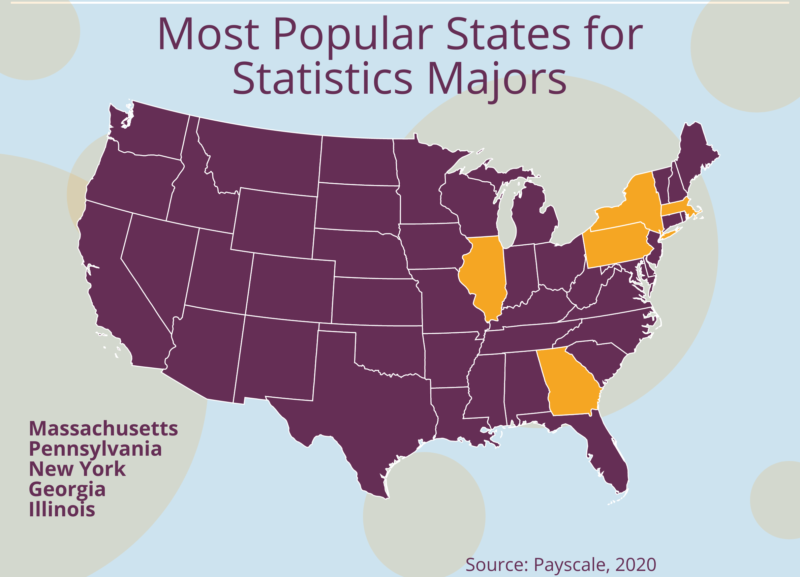Key Information:
- Degrees in data science and statistics open up a wide range of career paths, including roles such as financial analyst, operations research analyst, biostatistician, and market research analyst.
- These programs teach crucial skills such as data collection, statistical analysis, quantitative data sets, statistical models, and applied statistics, preparing students for real-world applications in various industries.
- Accreditation is critical as it ensures educational quality and increases job market readiness. Programs with ABET accreditation are particularly valued by employers.
The world of the 21st century runs on data science and statistics. With the advent of social media and digital marketing, the most lucrative product in the world isn’t a thing – it’s information. Statistics majors rule the world.
So is a data science degree worth it? With a bachelor’s degree in data science, students can find entry-level jobs in information technology departments at government and corporate employers. Those wondering how to get a degree in data science can look for courses online or at local colleges and universities.
Featured Schools
A bachelor’s degree in statistics can lead to lucrative careers in a number of different fields. Many students choose to get an undergraduate degree in statistics and a master’s in data science to fill the demand for expertise in this field.

Some career paths include:
- financial analyst
- operations research analyst
- biostatistician
- business analyst
- economist
- market research analyst
Data students learn problem-solving skills and use statistics for many real-world uses, from insurance companies to healthcare. Other things you’ll learn in statistics degree programs include:
- data collection
- statistical analysis
- quantitative data sets
- statistical models
- statistical methods
- applied statistics
Mathematicians and statistics students can increase the profitability of companies with their statistical knowledge.
What else makes a data science degree worth it? A bachelor’s degree in data science includes courses with information about data science theories. This degree prepares students to work with big data and data analytics. Those looking into how to get a degree in data science should choose from online options if they already have jobs or are looking to change careers and want to keep on working.
Future data scientists can begin preparing by becoming proficient in programming languages. You can do this by taking Python and Java to begin with. It’s also a good idea to refresh your knowledge of statistics and mathematics. Those who enter college or go back to school for a degree in data science will need these skills to finish their program with ease.
What about statistics – is a degree in statistics worth it? To be entirely realistic about it, statistics is a difficult discipline, and not for everyone. That means that, for those who are adept at the complicated mathematics involved, a career in statistics can be very rewarding. Simply because there’s less competition, statistics experts can name their own price – whether they go into data analysis, actuarial science, or any number of other careers.
Students can complete an undergraduate degree in data science in four years. Some students choose computer science, information technology, math or statistics at the undergraduate level and then go on to obtain a master’s in data science. Any degree that includes programming languages, SQL, database architecture and similar courses will set students up for success.
Now is the right time to go into statistics and data science. Students who build connections and professional networks before they graduate may have an easier time finding internships and gaining guidance from professors on job opportunities.
An entry-level job in computer science will fill the needs of many organizations looking to recruit and train junior data analysts. There’s a huge gap between the demand and supply for this skill set. With the right education, data science graduates can find companies willing to train them in specific subspecialties such as business intelligence, data visualization and relational database management.
Accreditation for Statistics and Data Science
Data science accreditation is a main consideration for students looking for a degree in this field. Accreditation guarantees that programs have high-quality educational standards and modern curricula. Employers look for degrees from respected universities when hiring data scientists. Additionally, students who have attended accredited universities will be much more prepared for the job market. Regional accreditation allow students to switch schools without losing transfer credits, and financial aid is typically only available for accredited data science programs.
Beyond institutional data science accreditation, Prospective students in online programs or brick and mortar schools should only look at degrees that have programmatic accreditation. This type of accreditation applies to the specific program to ensure it meets national standards.
Accredited data science programs Are valued by future employers. For example, schools that have the Computing Accreditation Commission of ABET are highly sought after. ABET issues programmatic accreditation focusing on computer technology, applied science and engineering.
Students can look up the accreditation for particular schools on the Department of Education’s website.
Types of Statistics and Data Science Degrees
With a degree in statistics online, students can go on to pursue a master’s degree in data science. Online degrees in statistics prepare still students for their mathematical rigor are the data science curriculum. Some of the specializations available for data science degrees online e include the following:
- Geographic Information Systems
- Finance
- Big Data and Analytics
- Software Development
- Marketing Analytics
Student often choose from majors such as a bachelor of data science online or statistics degrees online. Statistics degrees online include instruction in the visualization and management of software. Students who choose a degree in statistics online also learn how to interpret different kinds of data and use analytical analysis to gain insights from massive amounts of data. Online degrees in statistics gives data scientists the chance to perform experiments based on predicting outcomes from existing data. A statistics degree online requires building models based on data and inferences.

With an online degree in statistics, students can choose a concentration in data science or related field such as the following:
- Mathematics
- Computer Science
- Cybersecurity
- Business
- Economics
An online statistics degree is good preparation for people who want to go into data science at the master’s level or find a job that can morph into a data science career. These areas of specialization in statistics all work.
The types of statistics degrees required also depend on the career goals of individual students. Choosing from different types of statistics degrees can help students gain a broad education that gives them a lot of career choices.
Online data science degrees Have names such as the following:
- B.S. in Data Science
- B.S. in Data Analytics
- B.S. in Business Analytics
- B.S. in Data Science and Analytics
- B.S. in Data Analytics and Technology
- B.S. in Data Management and Data Analytics
- B.S. in Digital Information Technology
Getting a degree in data science online prepare students for lucrative jobs and information technology and other sectors. For students interested in online degrees in data science, there is much more flexibility for when and how they finished their degree. An online data science degree is a great choice for students who have families or current jobs that they don’t want to give up. A data science online degree Includes numerous areas for specialization, while a statistics degree online gives students a broader base for future career choices.
With an online degree in statistics, students can work for government agencies, corporations and private organizations looking for employees with strong computational skills. When students choose an online statistics degree, there are many areas of specialization in statistics. The types of statistics degrees vary from school to school and depending on the career goals of the students. Research different type of statistics degrees, including online data science degrees, to find one that fits your interest an experience. This is especially important if you’re going back to school for a second degree.
Many options open up for graduates with a degree in data science online. Whether students want to become a computer programmer or provide analysis for decision makers, online degrees in data science maybe the best way to accomplish this. With traditional schools or an online data science degree, they will receive the same education from an accredited university or college. With a data science online degree, students master a broad array of technical skills that they can leverage for high salaries for jobs that require a data science degrees online.
A bachelor of data science online gives students a broad skill set that includes:
- Fluency in Python, Java, SQL and similar programming languages
- The skills needed to succeed in the business sector. Students learn to find creative solutions to problems that involve business objectives.
- Data science students also learn to communicate clearly when it comes to technical and analytical topics. Data scientists often deal with nontechnical co-workers looking for an analysis of data to make decisions.
- Data science requires expertise in statistics, math, data mining, data visualization, reporting and unstructured data analysis.
- Students must also master machine learning tools.
Certifications/Licenses
Both SNHU and Great Basic College offer one to two-year certification programs. Students can also find free data science certifications that may help them advance in their careers. Free data science certificate program Include some of the most respected schools in the country. For students looking for data science certification free, the following courses may appeal to them.
IBM offer free data science certificates and so do Harvard and MIT.
IBM has a free online data science certification on Courera.org. The certification requires 9 courses they give students the skills they need to complete projects and work in the industry. Lectures include topics on analysis, visualization and open source tools. Students who complete the program gain skills that enhance their resume by completing projects and assignments. Instructors assist students with the fundamental techniques and in-depth knowledge needed to become data scientists. Students do not have to have prior programming experience.
Harvard University has a data science certification available on edX. Some courses in the series are also available for free. This program shows students data science essential such as ML and R. it consists of nine courses and is rated highly among edX courses. Concepts covered in include machine language, regression , Productivity Tools and a capstone project for hands-on experience.
Students can find other online certifications online as well.
MIT also has a certification program on edX. It only requires five courses to give students the fundamentals of data science and statistics. This program focuses on machine learning and data driven predictions. Students learn how to make statistical inferences and model complex data. Data science focuses on enhancing decision making with statistical and data driven analysis. In these programs, students learn to create algorithms that make sense of massive data dumps. Data scienctists work in a largely unsupervised environment to create value from projects such as deep neural networks.
Examples of data science certifications include:
- Certified Analytics Professional (CAP)
- Cloudera Certified Professional (CCP) Data Engineer
- Data Science Council of America (DASCA) Principle Data Scientist (PDS)
- Google Professional Data Engineer Certification
- Microsoft Certified: Azure AI Fundamentals
- Open Certified Data Scientist (Open CDS)
- SAS Certified Big Data Professional
- Tensorflow Developer Certificate
Students who already have a degree and another field can make the transition to data science by obtaining one of these certifications. These certifications are highly valued among government agencies, corporations and other perspective employers. Students who already have a job in information technology or a related field may consider taking one of these certifications to transition into a data scientist role. This could leave them in a great position for more lucrative career without switching companies or losing their existing benefits such as tenure or vacation time.
Careers in Statistics and Data Science
Statistics as a career can lead to lucrative roles as can a career in data science. Those looking for a career in statistic should look for accredited online or on campus programs that meet their specific needs. Statistics careers include jobs in academic settings as well as think tanks and government and private employers.
Those looking for a career in statistics should choose a concentration at the bachelor’s level or consider a master’s level degree to further careers in statistics. Jobs with a degree in statistics Start out at highly competitive salaries and a bachelor’s degree in statistics jobs it’s also a great jumping off point for those who wish to obtain a postgraduate degree.
What jobs can you get with a degree in statistics? Statistics bachelor degree jobs include opportunities in insurance, finance and related fields.
What jobs can you get with a data science degree? As previously discussed, jobs with a data science degree include departments such as information technology, finance and other departments that support decision making with analysis from big data.
Data science bachelor degree jobs Can lead to lucrative careers. What jobs can you get with a data science degree Depends on your previous experience and jobs with a data science degree often lead to six figure salaries, especially if students go on to obtain higher degrees or certifications.
Statistics as a career often leads to leadership roles in financial institutions and other lucrative positions. A career in statistic requires a great deal of mathematical prowess and analytical thinking. With an online degree, students can pursue statistics careers without giving up their day job. For those who already have a career in statistics but lack a formal degree, careers in statistics can open up with an online degree from an accredited university.
Jobs with a degree in statistics include positions as information technology experts, and statistics bachelor degree jobs position students well to move up within any organization Thanks to the valuable skills it brings with it.
What jobs can you get with a degree in statistics? Data science bachelor degree jobs require computer analytics, statistics, software development and other technical skills. These skills are useful in information technology, marketing and other jobs that require data driven decision making. This can include jobs at television networks, hospitals and military bases.
Data science is important to numerous industries. Those with statistics or data science degrees can find jobs that require projecting outcomes from big data. There is a huge market for data scientists due to a lack of qualified workers in this field. Those hoping to become data engineers or clinical data analysts can get there by starting with a data science or statistics degree.

Data Science and Statistics Salary Potential
A degree in statistics salary Averages $100,560, per the U.S. Bureau of Labor Statistics. This high salary reflects the realization that corporations and institutions require employees who are knowledgeable in the power of big data to drive decisions and make smart choices from an operational perspective. Lucrative statistics degree salary Further reflect the lack of data professionals who are uniquely qualified to meet this demand.
Those wishing to obtain a huge data science degree salary must obtain the education an experience needed to succeed in the field. Although a bachelors is a great start for entry level positions, those who wish to obtain the highest data science degree salary should consider a post grad certification or master’s degree.
How much can you make with a data science bachelor degree salary depends on a number of factors. Data scientists bring immense value to agencies, institutions and organizations which they work for. Finding one person who can perform a wide variety of data science task is challenging. Competition for data scientists is fierce among prospective employers. This puts data science graduates in a unique position of choosing the career that most appeals to them.
Factors impacting degree in statistics salary range also include experience, industry and job titles. A statistics degree salary is also determined by the company size and region in which the student works. A data science degree salary can be enhanced with higher education or certification achievements. Data science bachelor degree salary are influenced by the same factors.
According to Glassdoor, data scientists salaries average $120,000. The main factors that influence the salary are region and the size of the corporation students choose to work for. Fresh out of college, students may decide to work for smaller organizations with the hopes of moving up quickly. However, as seen by the glass door example, choosing a smaller role in a larger organization can often command higher salaries and opportunities to move between projects. Many students with data science degrees also obtain certifications specific to their industry and field of expertise.
Data Scientist Job Outlook
There are more companies looking for data scientists than there are data scientists available. That said, it’s very important for data science graduates to firmly grasp the technical and mathematical coursework in order to succeed in the industry. New educational opportunities are popping up online and elsewhere every day. Students should also be aware that some companies refer to data scientists by other names such as data analyst, data engineer or data architect. The best way to understand what skills companies need is to look at the job postings carefully and to inquire directly if chosen for an interview.

Professional Organizations
Even with the tremendous growth in this field, professional organizations can help new graduates learn about which companies are the best to work for. Professional organizations include opportunities to obtain certifications, network with others in the field and keep up with new trends in the industry.
Professional data science associations often distribute newsletters and other information that helps members stay informed about the latest innovations and technology. Staying abreast of new information and techniques is important at any point in a data scientist’s career. Remaining relevant is one of the toughest things when it comes to obtaining new employment or moving up in a current position.
There are many professional organizations for data scientists. A few are highlighted below.
- Association of Data Scientists: This association is a global body that includes machine learning and data science professionals.
- Data Science Association: This nonprofit association includes data scientist looking to improve the profession and Enhance diversity in the field
- INFORMS : This organization has 13,000 members and works to improve the field of data science from within.
Choosing careers in statistics and data science gives students an opportunity to go into a number of different industries and job settings. Data scientists and statisticians can be found everywhere from NASA to financial institutions in large cities. These jobs are universally valued, and students can find work anywhere in the country without too much effort. Also, going into a field such as data science gives students unprecedented freedom to choose their employer. The field shows no sign of slowing down and students who truly appreciate and master the field can choose their own destiny.
Related Rankings:
25 Best Bachelor’s in Statistics
25 Best Online Bachelor’s in Data Science
10 Most Affordable Bachelor’s in Data Science
25 Best Bachelor’s in Analytics
15 Best Online Bachelor’s in Analytics
